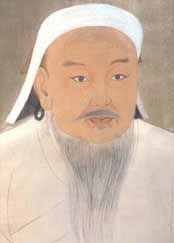
History's 2nd-Biggest Stud Found?

History's 2nd-Biggest Stud Found?
Discovery, November 8, 2005
Genghis Khan may have a competitor as history's biggest stud, according to a genetic study on the spread of the male-specific Y chromosome in northeastern China and Mongolia. Research, published in the current issue of the American Journal of Human Genetics, suggests that the newly found prolific lover left a legacy shared by about 1.5 million people alive today. The analysis is similar to a controversial study that in 2003 indicated about 16 million men alive today are descended from the Mongol emperor Genghis Khan. Chris Tyler-Smith, a geneticist at the Welcome Trust Sanger Institute in Hinxton, U.K., and colleagues in China examined the Y chromosome, which is passed unchanged from father to son, of 1,003 men representing 28 populations from China, Mongolia, Korea and Japan. Comparison of the DNA sequences at numerous locations along the Y chromosome revealed close similarities among 3.3 percent of the men, pointing to a common male ancestor. By counting the number of mutations in the lineage's Y chromosome, the researchers estimated that the alpha male lived about 600 years ago, give or take a few centuries.Ó We suggest that man was Giocangga, who died in 1582," Tyler-Smith told Discovery News.
Giocangga's grandson Nurhaci (1559-1626) founded the Qing dynasty that ruled China from 1644 to 1912 and established an elite class, the Manchu Imperial nobility. Able to keep many concubines, the members of this class were highly privileged: even a ninth-rank nobleman was entitled to receive 11 kilograms of silver and 22,000 litres of rice as his annual stipend. It was mandated that the Manchu Imperial nobility had to be male-line descendants of Giocangga, and officially numbered 80,000 by end of the dynasty. So history shows that Giocangga's male line expanded enormously, through the influence of Nurhaci and the Manchu conquest.
The Manchu army only mixed with certain ethnic groups. The same groups today show the highest frequency of Giocangga's "super" Y chromosome. As with Genghis Khan, the Giocangga genetic study has raised controversy among scientists. Luca Cavalli Sforza of Stanford University in California, for example, disputed both studies, calling them overly sensational. Conclusive evidence could come from examining the Y chromosomes of known descendents of the Qing nobility.